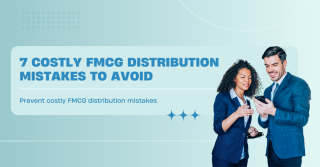Strategies To Launch A New Product And Win Retailer Trust

Launching a new product in a competitive market can be a daunting task, especially when retailers are hesitant to stock it on their shelves. Many entrepreneurs struggle to break into the market, facing rejection at every turn. So, how do you build trust and convince retailers to carry your brand?
In this blog, we'll explore the key steps and strategies to ensure your product gets noticed and reaches the right customers.
1. Building Trust through Professional Appearance and Communication
The first impression matters a lot, especially when you're dealing with retailers. Your presentation, both in terms of how you look and how you communicate, plays a crucial role in building trust. Retailers want to know that you're professional, serious, and reliable. It's essential to be well-groomed, confident, and respectful when approaching them. Body language also speaks volumes — a confident and positive attitude can help break down barriers.
When introducing your product, ensure that you're clear, concise, and confident in your pitch. Retailers are more likely to listen and engage if they sense that you believe in your product and have done your homework. Avoid coming across as overly aggressive; instead, focus on how your product can meet their needs.
2. Product Knowledge Is Key
Retailers expect you to know your product inside out. They want to understand how it stands out in the market, its unique selling points, its target consumer, and why it should be added to their store. Make sure you are prepared to answer questions about your product's features, pricing, and potential demand.
Moreover, having in-depth knowledge of the market is equally important. You need to be aware of current trends, competitors, and customer preferences. Retailers will appreciate your expertise and be more inclined to trust your judgment.
3. Understanding the Local Market
Every market is different, and every retail store has its unique needs and customer base. It's crucial to tailor your approach based on the location and the specific store. If a retailer already stocks similar products, your task is to clearly differentiate your product and explain why their customers would prefer yours.
Additionally, understanding the challenges faced by retailers in your target area — such as demand, seasonality, or pricing — will help you craft a more effective pitch. Knowledge of local market conditions makes you appear as an informed and reliable partner.

4. Consistency and Commitment to Long-Term Relationships
One of the most important factors in convincing retailers to stock your product is building a long-term relationship. Retailers value consistency and commitment from suppliers. Make sure you follow up regularly, keep your promises, and be available to address any concerns or issues. Retailers are more likely to trust you if they see that you're reliable and committed to supporting them.
By ensuring consistent communication and timely deliveries, you’ll build confidence in your brand and create a solid foundation for future business.
5. Effective Sales Processes and Support
It's essential to have clear, efficient processes in place. Retailers want to know that the process of ordering and receiving products is simple and hassle-free. Whether it's about stock availability, order placement, or product deliveries, make sure everything runs smoothly. Having a clear sales process and being organized can help you make a positive impression on the retailer.
Additionally, offering support to retailers — such as promotional material, training on the product, and addressing any concerns — can help you gain their trust. Retailers are more likely to stock your product if they feel supported throughout the process.
6. Overcoming Rejection and Maintaining Persistence
Rejection is common in the retail business, but it shouldn't discourage you. If a retailer says "no" initially, ask for feedback. Understand their reasons for turning down your product, and use that feedback to improve your pitch or strategy. Maybe they need more product information or better incentives. Every "no" brings you closer to a "yes" if you stay persistent and continue to refine your approach.
7. Leveraging Promotions and Incentives
Offer attractive promotional schemes, discounts, or incentives for retailers to encourage them to give your product a chance. Many retailers are willing to take a risk on new products if the margins are favorable or if there are incentives involved. This could be anything from limited-time offers to discounts on bulk orders or even promotional support like advertising or in-store displays.
Final Thoughts
Successfully launching a new product in a competitive market requires a combination of trust, knowledge, persistence, and clear communication. By following the above steps, you can establish a strong presence in retail stores, convince retailers to carry your product, and ultimately, build lasting relationships that benefit both parties.
Remember, the key to success in retail marketing is not just about having a great product — it's about making sure your product is positioned effectively, supported properly, and trusted by retailers. By consistently showing up, offering value, and understanding the needs of both the retailer and the customer, you can turn your product into a success.








